-

新人教版高中英语必修3Unit 5 The value of money-Reading and Thinking教学设计二
? Could you offer me some kind of work here?? I don’t want your charity, I just want an honest job.? Careless: I landed in Britain by accident.Step 7:Consolidation.? Find Henry? Roderick and Oliver were I .making a bet when they saw Henry, a poor young man. ? Know Henry? About a month ago, Henry was sailing and later he found himself carried out to sea by a strong wind. Fortunately, he 2.was spotted by a ship. And it was the ship that brought him to 3.England? Offer money to Henry ? Oliver and Roderick gave Henry a letter and told him that there was money in it. They 4.persuaded him to accept it, and made him 5.promise that it wouldn't be opened until 2 o'clock.Step 8:Language pointsa large amount of: a large quantity of; a great deal ofe.g. They bought a large amount of furniture before they moved their new house.make a bet: make an arrangement to risk money, etc. on an event of which the result is doubtful.e.g. We made a bet on the result of the match.permit sb to do something: allow somebody to do somethinge.g. My mother doesn’t permit me to ride in the street after it rained.by accident: as a result of chancee.g. I only found it by accident.stare at: look at somebody or something with the eyes wide open in a fixed gaze( in astonishment, wonder, fear, etc)to be honest: to tell you the truth; to be franke.g. To be honest, I don’t think we have a chance of winning.Step7 Homework:What do you think will happen to Henry? Will the bank-note help him or get him into trouble?

新人教版高中英语选修2Unit 1 Science and Scientists-Learning about Language教学设计
Step 7: complete the discourse according to the grammar rules.Cholera used to be one of the most 1.__________ (fear) diseases in the world. In the early 19th century, _2_________ an outbreak of cholera hit Europe, millions of people died. But neither its cause, 3__________ its cure was understood. A British doctor, John Snow, wanted to solve the problem and he knew that cholera would not be controlled _4_________ its cause was found. In general, there were two contradictory theories 5 __________ explained how cholera spread. The first suggested that bad air caused the disease. The second was that cholera was caused by an _6_________(infect) from germs in food or water. John Snow thought that the second theory was correct but he needed proof. So when another outbreak of cholera hit London in 1854, he began to investigate. Later, with all the evidence he _7_________ (gather), John Snow was able to announce that the pump water carried cholera germs. Therefore, he had the handle of the pump _8_________ (remove) so that it couldn't be used. Through his intervention,the disease was stopped in its tracks. What is more, John Snow found that some companies sold water from the River Thames that __9__________________ (pollute) by raw waste. The people who drank this water were much more likely _10_________ (get) cholera than those who drank pure or boiled water. Through John Snow's efforts, the _11_________ (threaten) of cholera around the world saw a substantial increase. Keys: 1.feared 2.when 3. nor 4.unless 5.that/which 6.infection 7.had gathered 8.removed 9.was polluted 10.to get 11. threat

新人教版高中英语选修2Unit 1 Science and Scientists-Using langauge教学设计
This happens because the dish soap molecules have a strong negative charge, and the milk molecules have a strong positive charge. Like magnets, these molecules are attracted to each other, and so they appear to move around on the plate, taking the food coloring with them, making it look like the colors are quickly moving to escape from the soap.Listening text:? Judy: Oh, I'm so sorry that you were ill and couldn't come with us on our field trip. How are you feeling now? Better?? Bill: Much better, thanks. But how was it?? Judy: Wonderful! I especially liked an area of the museum called Light Games.it was really cool. They had a hall of mirrors where I could see myself reflected thousands of times!? Bill: A hall of mirrors can be a lot of fun. What else did they have?? Judy: Well, they had an experiment where we looked at a blue screen for a while, and then suddenly we could see tiny bright lights moving around on it. You'll never guess what those bright lights were!? Bill: Come on, tell me!? Judy: They were our own blood cells. For some reason, our eyes play tricks on us when we look at a blue screen, and we can see our own blood cells moving around like little lights! But there was another thing I liked better. I stood in front of a white light, and it cast different shadows of me in every color of the rainbow!? Bill: Oh, I wish I had been there. Tell me more!? Judy: Well, they had another area for sound. They had a giant piano keyboard that you could use your feet to play. But then, instead of playing the sounds of a piano, it played the voices of classical singers! Then they had a giant dish, and when you spoke into it, it reflected the sound back and made it louder. You could use it to speak in a whisper to someone 17 meters away.? Bill: It all sounds so cool. I wish I could have gone with you? Judy: I know, but we can go together this weekend. I'd love to go there again!? Bill: That sounds like a great idea!

新人教版高中英语选修2Unit 3 Food and Culture-Reading and thinking教学设计
The discourse explores the link between food and culture from a foreign’s perspective and it records some authentic Chinese food and illustrates the cultural meaning, gerography features and historic tradition that the food reflects. It is aimed to lead students to understand and think about the connection between food and culture. While teaching, the teacher should instruct students to find out the writing order and the writer’s experieces and feelings towards Chinese food and culture.1.Guide the students to read the text, sort out the information and dig out the topic.2.Understand the cultural connotation, regional characteristics and historical tradition of Chinese cuisine3.Understand and explore the relationship between food and people's personality4.Guide the students to use the cohesive words in the text5.Lead students to accurately grasp the real meaning of the information and improve the overall understanding ability by understanding the implied meaning behind the text.1. Enable the Ss to understand the structure and the writing style of the passage well.2. Lead the Ss to understand and think further about the connection between food and geography and local character traits.Step1: Prediction before reading. Before you read, look at the title, and the picture. What do you think this article is about?keys:It is about various culture and cuisine about a place or some countries.

新人教版高中英语选修2Unit 5 First Aid-Discovering useful structures教学设计
You have no excuse for not going.你没有理由不去。He was punished for not having finished his homework.他因未完成作业而受到惩罚。2.动词ing形式复合结构由物主代词或人称代词宾格、名词所有格或普通格加动词ing,即“sb./sb.'s+doing”构成。动词ing形式的复合结构实际上是给动词ing形式加了一个逻辑主语。动词ing形式的复合结构有四种形式:①形容词性物主代词+动词ing②名词所有格+动词ing③代词宾格+动词ing④名词+动词ingHer coming to help encouraged all of us.她来帮忙鼓舞了我们所有人。The baby was made awake by the door suddenly shutting.这个婴儿被突然的关门声吵醒了。Can you imagine him/Jack cooking at home?你能想象他/杰克在家做饭的样子吗?无生命名词无论是作主语还是作宾语都不能用第②种形式。Tom's winning first prize last year impressed me a lot.汤姆去年得了一等奖使我印象深刻。Do you mind my/me/Jack's/Jack leaving now?你介意我/杰克现在离开吗?Excuse me for my not coming on time.很抱歉我没能按时来。His father's being ill made him worried.他父亲病了,他很担心。We are looking forward to the singer's/the singer to give us a concert.我们盼望着这位歌手来给我们举办一场演唱会。
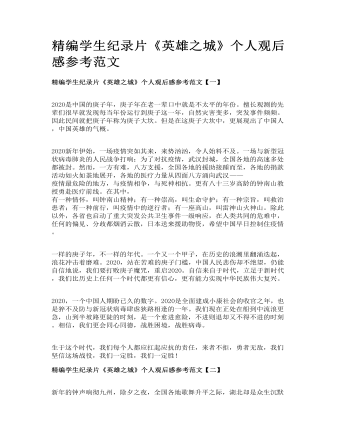
精编学生纪录片《英雄之城》个人观后感心得体会参考范文
2020新年伊始,一场疫情突如其来,来势汹汹,令人始料不及。一场与新型冠状病毒肺炎的人民战争打响;为了对抗疫情,武汉封城,全国各地的高速多处都被封。然而,一方有难,八方支援,全国各地的援助接踵而至,各地的捐款活动如火如荼地展开,各地的医疗力量从四面八方涌向武汉——疫情最危险的地方,与疫情相争,与死神相抗。更有八十三岁高龄的钟南山教授勇赴医疗前线。在其中,有一种情怀,叫钟南山精神;有一种崇高,叫生命守护;有一种宗旨,叫救治患者;有一种前行,叫疫情中的逆行者;有一座高山,叫雷神山火神山。除此以外,各省也启动了重大突发公共卫生事件一级响应,在人类共同的危难中,任何的偏见、分歧都烟消云散,日本送来援助物资,希望中国早日控制住疫情。
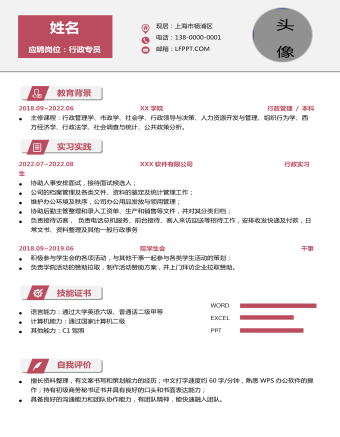
行政文员类岗位面试求职简历
l 协助人事安排面试,接待面试候选人;l 公司的档案管理及各类文件、资料的鉴定及统计管理工作;l 维护办公环境及秩序,公司办公用品发放与领用管理;l 协助后勤主管整理和录入工资单、生产和销售等文件,并对其分类归档;l 负责接待访客, 负责电话总机服务、前台接待、客人来访迎送等招待工作,安排收发快递及付款,日常文书、资料整理及其他一般行政事务
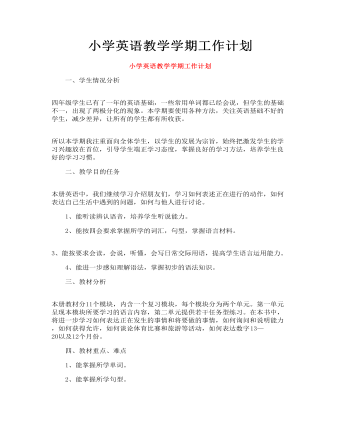
小学英语教学学期工作计划
1、能听读辨认语音,培养学生听说能力。 2、能按四会要求掌握所学的词汇,句型,掌握语言材料。 3、能按要求会读,会说,听懂,会写日常交际用语,提高学生语言运用能力。 4、能进一步感知理解语法,掌握初步的语法知识。
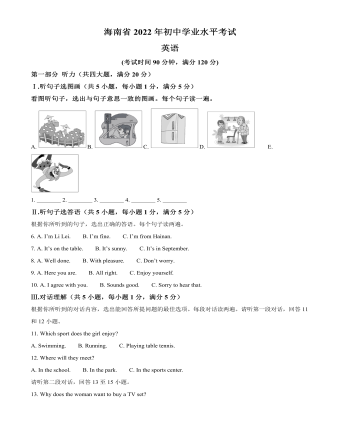
2022年海南省中考英语真题(解析版)
In the late autumn, John was badly ill andbecame bedridden (长期卧床的).After the doctor visited John several times, he told Sue, “His condition isquite ___22___.John seems to have lost all will to live. If he doesn’t want to live, medicineswill not help him.”
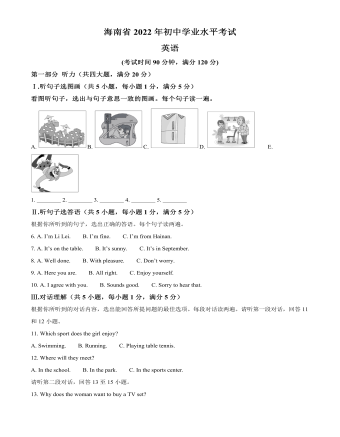
2022年海南省中考英语真题(原卷版)
YangHongwei, 56, was born into a kite-making family in Weifang. When she was young,she often saw kites with bright colors and different shapes in hergrandfather’s workshop.
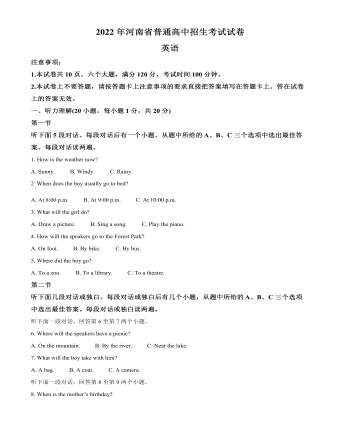
2022年河南省中考英语真题(原卷版)
In the large yard stood thirteen trees ofdifferent sizes. One day, while Joey was playing with his sister under thetrees, he noticed that a tree trunk (树干) had a sad look. He raninto the house to tell his mom about it. She told Joey to find the reason whyit was sad.
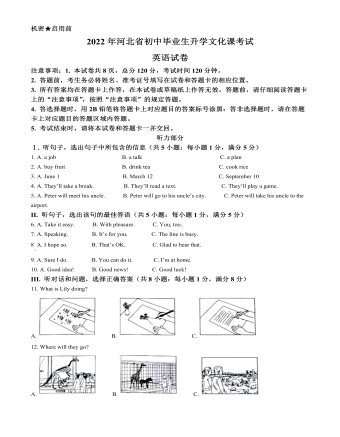
2022年河北省中考英语真题(原卷版)
As a boy, Kevin visited national parks and helearned the Earth is in ___12___ condition. He felt worried, and hewanted to ___13___ the Earth. In 2009, he went to swim in water nearNorth Pole(北极)todraw people’s attention to the melting glaciers(融化的冰川).
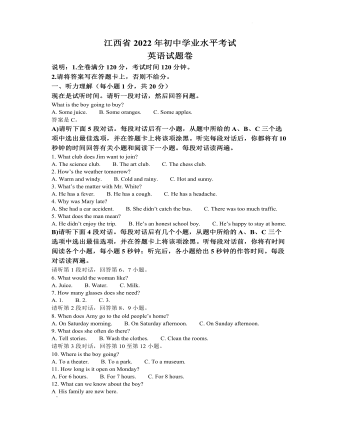
2022年江西省中考英语真题(原卷版)
Long ago, a poor old couple lived on the coast.One day, an old storyteller came to their village. The old couple gave him ameal. In return, he gave them a coffee mill (磨粉机)and said, “Say, ‘Mill, please grind (磨粉)’,”
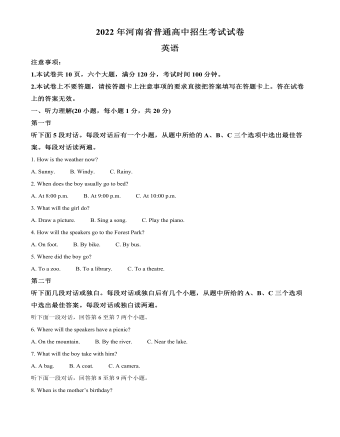
2022年河南省中考英语真题(解析版)
In the large yard stood thirteen trees ofdifferent sizes. One day, while Joey was playing with his sister under thetrees, he noticed that a tree trunk (树干) had a sad look. He raninto the house to tell his mom about it. She told Joey to find the reason whyit was sad.
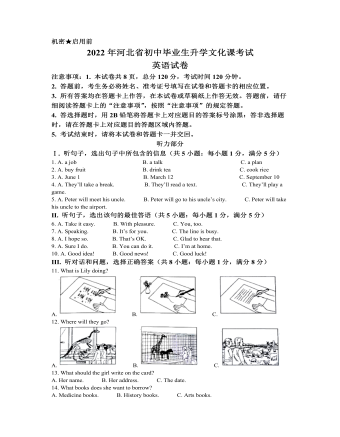
2022年河北省中考英语真题(解析版)
As a boy, Kevin visited national parks and helearned the Earth is in ___12___condition. He felt worried, and he wanted to ___13___ the Earth. In 2009, he went to swim in waternear North Pole(北极)todraw people’s attention to the melting glaciers(融化的冰川).
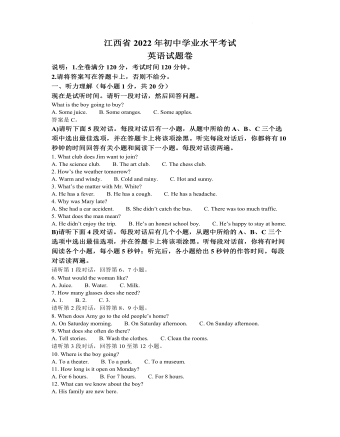
2022年江西省中考英语真题(解析版)
The app — called Sit With Us — is ___15___. If a student is having lunch in the afternoon,he or she can create an invitation. Other students can open the app and ___16___ that invitation. They can then use the app todecide when and where to ___17___.
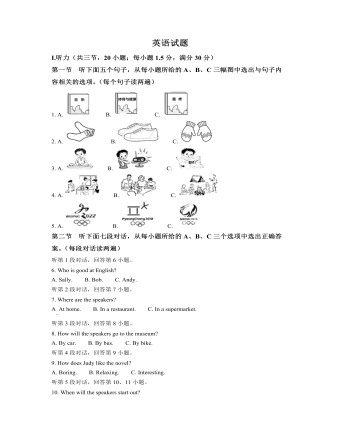
2022年福建省中考英语真题(原卷版)
Thinking that her dream could never come true,Kelly was in low spirits and ____18____ her studies at school. Hermother did all she could to cheer her up, ____19____ Kelly refused tochange. She even took out all her anger and ____20____ on her mother.
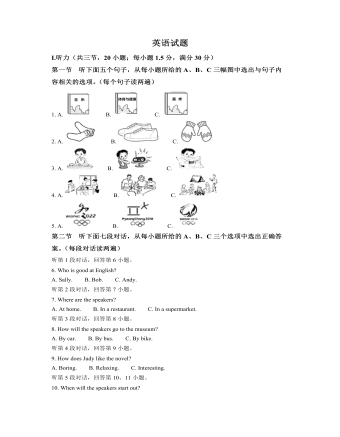
2022年福建省中考英语真题(解析版)
At the age of nine, Kelly dreamed of being abasketball player. But one day when she was playing basketball, she hurt herleft leg ____16____.
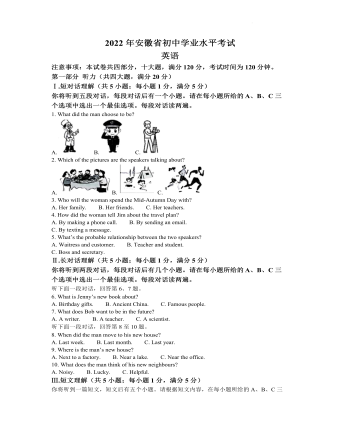
2022年安徽省中考英语真题(解析版)
Antarctica lies in the most southern part of theworld. It is the coldest area on Earth. There isn’t much rain, but there is alot of snow and wind. The lowest temperature was on 21 July in 1983 at -89.2℃!
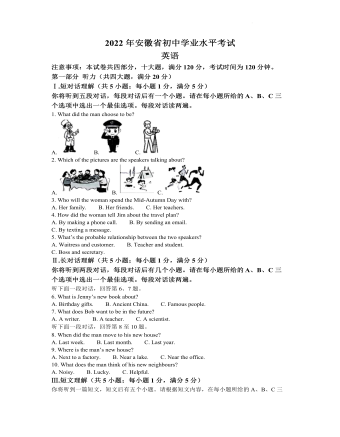
2022年安徽省中考英语真题(原卷版)
During 1907-1909, British explorer EarnestShackleton explored Antarctica on foot. In 1911, two explorers—a British mannamed Scott and a Norwegian named Amundsen—raced 1, 400 kilometres to the SouthPole (南极).Amundsen arrived first.